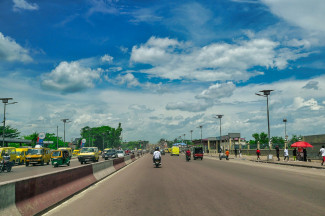"We would like to say thank you for this infrastructure project. We want to have a place where the tourists can enjoy their time, relaxing, chatting with us and looking at our products in a well-designed building structure, which will allow all products to be visible and therefore attractive to the tourists."
Florence is seated at the site where the former market was located. She looks around pensively as she recalls the extreme devastation caused by Tropical Cyclone Pam that hit Vanuatu in March 2015, as a consequence of which she and the 90 other sellers ("Mamas") in her Association did not have a place anymore to sell their goods to incoming tourists. All trading activities were drastically reduced and tourism activities destroyed, critically limiting job and income opportunities in one of the poorest countries in the Pacific.
Now with the launch of the Vanuatu Tourism Infrastructure Project in August 2015, renewed hope has been built, contributing to Vanuatu's reconstruction after the destruction caused by the Cyclone.
This Project supported by the EIF Programme together with New Zealand and the Government of Vanuatu will help Vanuatu rebuild its vital tourism infrastructure and in particular support the regeneration of the tourism portside and seafront precincts in Port Vila. It also ensures an integrated approach to environmental management, with an improvement in resilience to natural disasters and climate change. As an example, the building of a rock revetment along the bay will help protect the coastline from further erosion, other cyclones and sea level rise.
And to Florence, this support means a new start helping her and the 90 Mamas to make an income, put food on the table at home and pay school fees for their children. She adds with a smile,
If you would like to reuse any material published here, please let us know by sending an email to EIF Communications: eifcommunications@wto.org.



